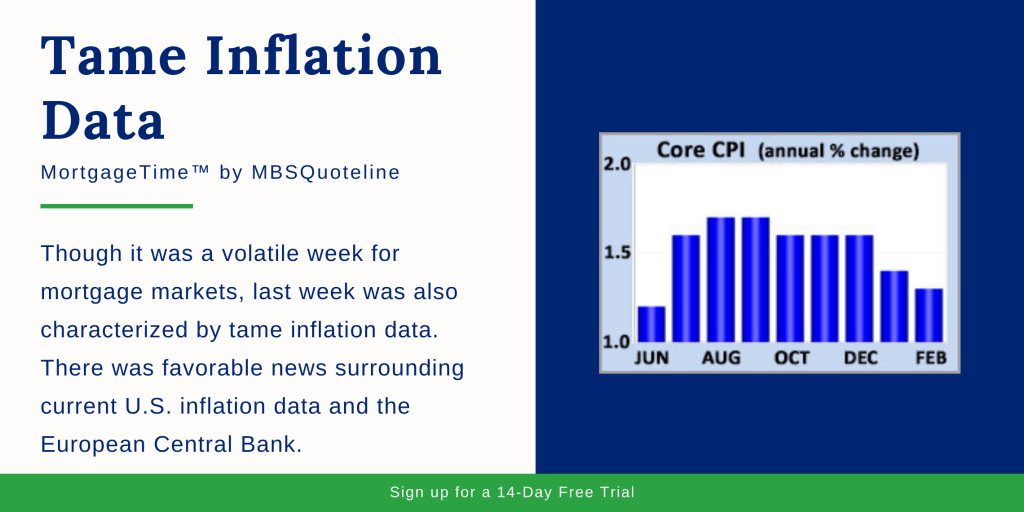Though it was a volatile week for mortgage markets, last week was also characterized by tame inflation data. There was favorable news surrounding current U.S. inflation data and the European Central Bank.
Increased concerns about higher future inflation offset that positive news. Mortgage rates ended the week with little change.
Tame Inflation Data
The latest figures released this week revealed that current inflation remained at historically low levels. Investors and economic analysts widely follow the Consumer Price Index (CPI) monthly inflation report. It looks at the price change for goods and services.
In February, Core CPI was just 1.3% higher than a year ago. Core CPI declined from an annual rate of increase of 1.4% last month. It was also lower than the 2.3% statistic in February 2020.
Despite the tame inflation data, some investors worry about a significant inflation increase later in 2021. As the vaccine rollout progresses, there may be pent-up demand in certain economic sectors. This includes potential price spikes in the travel industry.
Rising inflation reduces the value of future cash flows from bonds. Because of this, rising inflation negatively impacts mortgage-backed securities (MBS). This in turn, negatively affects mortgage rates.
European Central Bank & Bond Yields
Although last week showed tame inflation data, there are concerns surrounding future inflation. These concerns influenced global bond yields to climb significantly this year. However, two major central banks took different stances on the appropriate policy response, affecting mortgage markets.
Last week, U.S. Fed Chair Powell acknowledged the strength but did not give any indication that the Fed intends to attempt to restrain long-term bond yields.
If we do see what we believe is likely a transitory increase in inflation, where longer-term inflation expectations are broadly stable, I expect that we will be patient.
Federal Reserve Chair Jerome Powell
By contrast, the European Central Bank (ECB) announced on Thursday that it plans to increase the pace of bond purchases “significantly” going forward to help stabilize yields and boost the economy.
The ECB may feel more pressure to loosen monetary policy than the Fed. Overall, the eurozone is projected to grow around 4% this year. This compares to a much stronger 6.5% estimate for the United States.
Fannie Mae Loan Acquisition
Late Wednesday, Fannie Mae announced that they will limit their acquisition of loans secured by second home and investment properties to 7% of total loans. As a result, they have changed eligibility requirements for these types of loans.
In addition, to limit volume and comply with the new limit, many lenders announced immediate and significant pricing adjustments for these types of loans, and it is expected that others will follow suit.
Time will tell how this readjusts the tame inflation data.
Looking Ahead After Tame Inflation Data
Looking ahead after tame inflation data, investors will continue watching COVID-19 case counts and vaccine distribution. Beyond that, Retail Sales will be released on Wednesday.
Retail sales data is a key indicator of growth since consumer spending accounts for over two-thirds of all economic activity in the United States. Thus, this can greatly impact mortgage markets. The next Fed meeting will take place on Wednesday, and no policy changes are expected. Housing Starts also will come out on Wednesday.
Want to see how tame inflation data affects mortgage-backed securities? Never miss an update with MBSQuoteline. To receive by-the-minute updates on mortgage-backed securities, try our platform free for 14 days.
Stay connected with MBSQuoteline on social media by following us on Facebook and LinkedIn.
All material Copyright © Ress No. 1, LTD (DBA MBSQuoteline) and may not be reproduced without permission. To learn more about the MortgageTime™ newsletter, please contact MBSQuoteline at 800.627.1077 or info@mbsquoteline.com.



